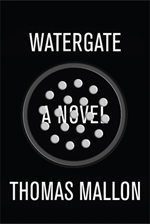A New Cast for a Famous Scandal
 In Watergate: A Novel (Pantheon, 2012), GW's Director of Creative Writing and local historical fiction expert, Thomas Mallon, re-examines the botched caper that caused the downfall of Vice President Spiro Agnew; the resignation of President Richard Nixon; the elevation of an unelected vice president—Gerald Ford—to the presidency, and the incarceration of 43 people.
In Watergate: A Novel (Pantheon, 2012), GW's Director of Creative Writing and local historical fiction expert, Thomas Mallon, re-examines the botched caper that caused the downfall of Vice President Spiro Agnew; the resignation of President Richard Nixon; the elevation of an unelected vice president—Gerald Ford—to the presidency, and the incarceration of 43 people.
As he has so capably discharged in his earlier historical novels, Dewey Defeats Truman, Henry and Clara, Fellow Travelers, and Aurora 7, Dr. Mallon rejuvenates a significant piece of history. With Watergate, for example, many of the 112 names on his character roster may no longer be well known—Joe Alsop, Jeb Stuart Magruder, Bebe Rebozo, Samuel Ervin, James O. Eastland, and Leon Jaworski—but they embodied a larger national-emergency-in-the-making that seesawed the nation between a catastrophic Nixon/Agnew ouster and one resignation—Nixon's—that would be cushioned by the appointment of a new vice president/soon-to-be-president. These events are worthy of study, particularly because they are unlikely to occur again.
Within the framework of this depicted urgency, Dr. Mallon brushes in goodness, charity, and dimension through other points of view. Presidential aide Fred LaRue, for example, who was obscure to the public, is written in as an operative who would fix things up with the committee—and couldn't—especially for his beloved friend, John Mitchell, while Nixon's secretary/confidante, Rose Mary Woods, catapulted to renown and infamy for erasing 18 and a half minutes of secret testimony. She was so protective of her boss that she cornered herself into loneliness and after-the-job social isolation.
Mallon's account uses Mr. LaRue, along with Mr. Mitchell, to depict an irony of the break-in: that neither high-ranking nor lower-level officials had knowledge of who gave the order:
"I can tell he [E. Howard Hunt] wants me to take the blame," said Mitchell. "Colson wants me to do it, too, and so does Haldeman. Just step up to some microphone and say I ordered the break-in. The Democrats will think they've solved that mystery where even the trial couldn't. And they'll lose interest in our little cover-up, because it would have failed."
"There's only one problem with that," said LaRue.
Mitchell nodded. "The small fact
that I never ordered the break-in."
"I know you didn't," said LaRue.
"Who did?" asked Mitchell.
"I don't know."
"Neither do I…"
Furthering the cast of unusual-for-Watergate limelighters, Alice Roosevelt Longworth, daughter of Theodore Roosevelt, appears in Dr. Mallon's story. Ms. Longworth was a Nixon ally of many years, despite her ascending criticism of his unwise and irrational decisions. Other characters included Pat Nixon. She was not precisely the "long-suffering" spouse, as often reported. If Mallon is accurate, she was a perceptive, loyal partner/counselor, who often maneuvered two versions of herself: the schoolteacher, Miss Ryan, from the long-ago years of innocence in Whittier, Calif.—before Richard Nixon—and the political wife who continued to swallow the repeated public humiliations disseminated by her husband—within an occupation—where advancing the country was often subordinate to getting even.
And some of the usual suspects, including The Washington Post's Carl Bernstein and Bob Woodward, are only merely mentioned.
Nixon is still a main figure, of course. Dr. Mallon elaborates on Nixon's elaborate tape recording system in the Oval Office, which had secretly documented conversations. Because of its existence, Nixon entangled himself—accidentally—by withholding the information. Ironically, the election was less than five months away, with an already predicted landslide for him. Eventually, the committee requested the tapes; the president balked; the committee demanded the materials; Nixon stalled:
"…What had been the point of making the tapes in the first place? Whatever they contained about his grand policy designs, Kissinger [Secretary of State] would still get all the credit…"
Finally, the U.S. Supreme Court ordered Nixon to release the cache of information to the U.S. Government; he relented—and quit. And the rest, as they say, is history–or, as in the case of Dr. Mallon's novel, fiction.
—David Bruce Smith, BA '79
